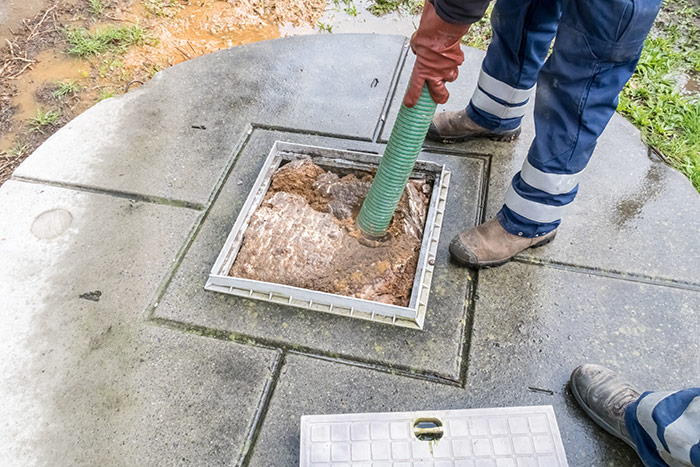
An overloaded septic tank can lead to health issues and costly repairs.
Typically, septic tanks need to be pumped every 2-5 years, depending on the system and how much use it gets. Ignoring the signs that your tank is full can lead to messy and costly repairs and potential safety issues. Here are the top seven warning signs your septic tank is full—and what to do if you notice them.
What are the signs that your septic tank is full? Well, an important thing to know is that a septic tank has a normal “full” level. This is the standard operating level amount, which is normally 8 to 12 inches from the top of the tank. However, you should leave inspecting the levels of your septic tank to a professional because of exposure to hazardous gases and bacteria.
Although you should not check the tank yourself, you will know the septic tank is full by the following signs:
1. Drains Are Backing Up
One of the worst and most hazardous signs that your septic tank is full is if your drains are backing up. A major sign is if you flush the toilet and have water backing up in other drains, such as the bathtub. Sometimes, it can also mean a clog, but either situation needs to be addressed immediately.
If you notice sewage backing up in any of your drains, you need to avoid using water and call a professional septic tank cleaner as soon as possible.
2. Pipes Make Gurgling Sounds
If you hear gurgling sounds coming from your pipes, it is one of the telltale signs your septic tank is full.
This can be an indicator that your tank is overly filled with solid waste, and this does not allow the wastewater to be disbursed. Of course, bubbling and gurgling pipes can also stem from blocked pipes, drains, and drain vents. That’s why it’s vital to call in a professional if your pipes are making odd noises.
3. Water Drains Slowly
Do your drains seem to be taking their sweet time to empty? If the drains in your entire home are slow to drain, it could be a clog in the main line, or your septic tank is full. When the tank is too full, it can’t operate correctly, which will cause the water to not drain properly.
However, if the issue occurs in one room and not the entire home, it may be an isolated drain clog or plumbing issue.
4. Bad Odors in Your Home or Yard
If you notice foul odors that smell like rotten eggs in your home or yard, that’s a huge warning sign that your septic tank is having issues. There are a few things that could be causing your septic tank to stink, such as clogged drains, blocked vents, or a broken pump. But it can also be a sign that your septic tank is full.
Septic tanks contain hazardous gases, so this smell is not something you should ignore. The primary gases that are present in septic tanks are hydrogen sulfide and methane. Long-term exposure can cause an array of health problems and can even be fatal.
So, follow your nose, and if you smell anything resembling the odor of sulfur, call a professional plumber or septic tank cleaner immediately.
5. Pooling Water in Your Yard
Do you have pools of water in your yard near your septic tank or drain field? Chances are your tank is overflowing, and that’s why you have standing water near the tank. The wastewater has nowhere to go but out.
This water can contain bacteria and is very likely hazardous. Don’t allow pets or children near it, and have your septic tank inspected as soon as possible.
6. Drain Flies
If you have tiny flies buzzing around, it can be a sign that the septic tank is full or there is a problem with the pipes. Drain flies, also known as sewer gnats, feed and lay eggs on decaying organic matter.
So, an overfull septic tank provides a breeding ground for these little pests. They are only about ⅛ of an inch big, but you will notice them hovering around bathtubs, sinks, and showers.
7. Grass Looks Lush
If you notice an area in your yard with lush grass or an area that is consistently soggy, it could mean your septic tank is having problems. This can be from a clogged leach line that runs to your distribution field, or it could be that the tank is malfunctioning or is full.
The wastewater provides “fertilizer” and extra water, which causes the grass to become healthier. Unfortunately, this is not a good thing, and you need to have your septic system inspected to figure out what is causing the issue.
Contact Morse Engineering and Construction for more information on septic systems.
Source: angi.com/articles
